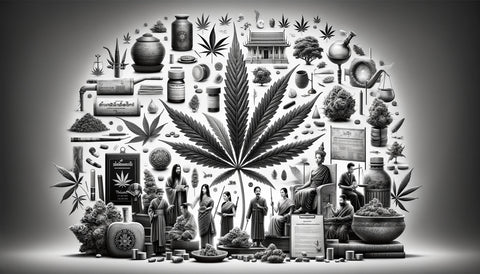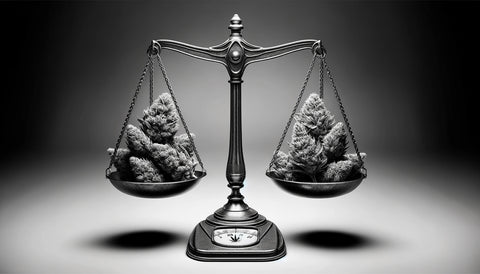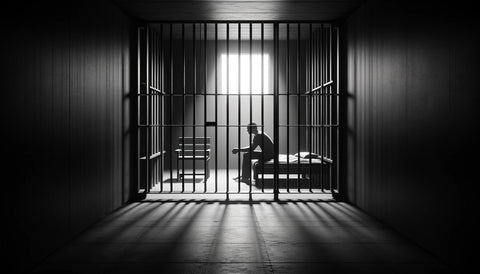Thailand's journey with cannabis has been both historic and tumultuous, marked by a progressive leap that saw the country becoming the first in Asia to decriminalize the plant in June 2022. This bold move was initially hailed as a pioneering step towards liberalizing cannabis use, with the promise of fostering a medical marijuana industry and encouraging the cultivation and consumption of cannabis for therapeutic purposes.
The decriminalization led to an explosive growth of the cannabis industry, with a surge in dispensaries, cafes, and various businesses that catered to an eager domestic and international clientele, intrigued by Thailand's relaxed cannabis laws. However, this rapid expansion and the ensuing societal concerns have prompted a significant policy reversal. Less than two years after decriminalization, the Thai government, citing concerns over recreational misuse and its implications, especially on youth, is now poised to ban recreational cannabis use, retaining its legality strictly for medical purposes. This decision encapsulates the complexities and challenges of regulating a substance that straddles legal, cultural, and economic domains, reflecting a broader global debate on cannabis legalization and control .
History of Cannabis in Thailand

Thailand's relationship with cannabis, historically stringent, took a dramatic turn in 2018 when the country legalized the plant for medical use, setting a precedent in Asia. This initial step aimed to leverage cannabis's therapeutic benefits, showcasing Thailand's progressive stance on drug policy and opening avenues for medical research and application. By 2022, the Thai government expanded this liberal approach by decriminalizing the cultivation and consumption of cannabis for both medical and general purposes. This landmark decision, the first of its kind in Asia, was intended to foster a burgeoning medical marijuana industry, promote agriculture, and generate economic opportunities within a regulated framework.
However, the legalization catalyzed the rapid proliferation of cannabis-related businesses across the nation. Almost overnight, a vibrant industry emerged, with approximately 20,000 dispensaries, cafes, and shops springing up, significantly altering the landscape of cannabis consumption in Thailand. This boom was both celebrated for its entrepreneurial spirit and critiqued for its regulatory challenges. The surge in businesses highlighted the government's underpreparedness to manage the unanticipated scale of the industry's expansion, particularly concerning recreational use, which remained in a legal gray area despite the focus on medicinal applications.
Political parties and public health officials raised concerns over the unintended consequences of such rapid liberalization. The general election saw promises from various political factions, including the Pheu Thai Party and even the progressive Move Forward Party, to reintroduce stricter cannabis laws, emphasizing a distinction between medicinal and recreational use. This collective push signaled a broad consensus on reevaluating the country's cannabis policy, underscoring the complex dynamics between economic opportunity, public health, and societal norms .
The Recent Decision to Ban Recreational Cannabis

In a significant shift, Thailand's government announced its intention to ban recreational cannabis use, underscoring a major reversal from its previous decriminalization policy. This decision came amidst growing concerns about the unchecked expansion of the cannabis industry and its potential social implications, particularly its accessibility to the youth and the feared gateway to other drug uses.
The new conservative coalition government, which assumed power late last year, has taken steps to address these concerns by proposing stringent regulations through a draft bill. The bill outlines severe penalties for recreational cannabis use, including hefty fines and imprisonment. Specifically, individuals found using cannabis recreationally could face fines up to 60,000 baht ($1,700), with more severe penalties, including jail terms of up to a year and fines up to 100,000 baht ($2,786), for those selling cannabis for recreational use or engaging in related advertising and marketing activities. Additionally, unauthorized cannabis farming could lead to prison terms of up to three years and fines up to 300,000 baht ($8,355).
Under the draft legislation, the import, export, cultivation, and commercial use of cannabis will now require government permits. This move aims to ensure that cannabis cultivation and use are strictly for medical and health industry purposes, aligning with the government's stance that cannabis should serve primarily therapeutic roles rather than recreational ones. The government's plan includes a grace period for businesses to adapt to the new regulations, signaling a transition towards tighter control over the cannabis market within a legal and regulatory framework that prioritizes public health and safety .
The proposed ban reflects a broader global debate on cannabis policy, where countries grapple with balancing the economic opportunities presented by the cannabis industry against the need to protect public health and societal well-being. Thailand's case is particularly noteworthy as it represents one of the most rapid liberalizations and subsequent retractions of cannabis policy seen anywhere in the world.
Potential Effects of the Ban

The Thai government's decision to ban recreational cannabis is set to have far-reaching implications, affecting various facets of society, the economy, and the burgeoning cannabis industry that flourished under the decriminalization policy.
Impact on the Cannabis Industry
The industry, which experienced exponential growth following decriminalization, is likely to face challenges as the new regulations take effect. Businesses that thrived on the recreational use market might see a decline in consumer demand, affecting revenue and possibly leading to closures. Entrepreneurs and investors who had capitalized on the liberalized cannabis laws now face uncertainty and may need to pivot their business models to align with the medical and health-focused cannabis market exclusively.
Societal Implications
Public health officials and proponents of the ban argue that tighter regulations will protect youth and prevent the potential for cannabis to act as a gateway to more harmful substances. However, critics of the ban worry about the loss of a progressive policy that differentiated Thailand in a region known for stringent drug laws. The ban might also reignite debates on drug policy, addiction, and the role of government in regulating substance use.
Economic Considerations
The burgeoning cannabis industry had become a significant economic driver, creating jobs, generating tax revenue, and attracting tourism. The ban poses questions about the economic impact, especially for rural areas where cannabis cultivation had offered a new and lucrative agricultural venture. Adjusting to a strictly medical cannabis market will require adaptation, potentially affecting the livelihoods of farmers, retailers, and others involved in the supply chain.
Legal and Enforcement Challenges
Implementing and enforcing the new regulations presents its own set of challenges. The government will need to navigate issues related to monitoring and enforcement to ensure compliance with the stricter laws. Additionally, the transition period offers a critical time for businesses to adjust, but it also necessitates clear guidance and support from the government to navigate the legal changes.
International Perception
Thailand's policy reversal might influence its international image, particularly among tourists and international investors who viewed the country's liberal cannabis policy as progressive. How Thailand manages this transition and addresses both domestic and international concerns will be crucial in maintaining its standing on the global stage.
In summary, while the ban aims to address public health and societal concerns, its implications are complex and multifaceted, touching on economic, legal, and cultural dimensions. The coming months will be telling in how Thailand navigates this significant policy shift, balancing the interests of various stakeholders while aiming to protect public health and safety.
Thailand’s Cannabis Culture Compared to the Rest of Asia

Thailand's initial move to decriminalize cannabis set it apart in a region known for some of the world's strictest drug laws. This section compares Thailand's evolving cannabis culture with the broader context of cannabis regulation across Asia, highlighting the diverse approaches and attitudes toward cannabis across the continent.
Stringent Policies in Neighboring Countries
In stark contrast to Thailand's brief period of cannabis liberalization, neighboring countries in Southeast Asia maintain rigorous anti-cannabis statutes. For example, Singapore continues to enforce the death penalty for serious drug trafficking offenses, including cannabis. Similarly, countries like Malaysia and Indonesia have harsh penalties for cannabis possession and trafficking, often resulting in long prison sentences or capital punishment. This discrepancy underscores the region's generally conservative stance on drug policy, making Thailand's decriminalization, and subsequent retraction, all the more remarkable.
Medical Use and Research
Despite stringent laws against recreational use, there is a growing interest in the medical applications of cannabis across Asia. Countries like South Korea and Japan have started to explore the therapeutic potential of cannabis, albeit under strict regulations. South Korea, for instance, has legalized medical cannabis, albeit in a very controlled manner, focusing on non-psychoactive components like CBD for treatment purposes. This cautious approach reflects a regional trend of recognizing cannabis's medical benefits while strongly opposing its recreational use.
Cultural Attitudes and Enforcement Challenges
Cultural attitudes toward cannabis vary significantly across Asia, influenced by historical use, religious practices, and contemporary legal frameworks. In regions with historical cannabis use in traditional medicine, such as certain parts of India and Nepal, there's a complex interplay between traditional practices and modern drug policies. However, the enforcement of cannabis laws and the public's attitude towards cannabis use are often influenced by international drug control treaties and domestic policy decisions, leading to a wide range of enforcement practices, from strict prohibition to conditional tolerance.
Economic Implications and Tourism
Thailand's brief foray into a more liberal cannabis policy highlighted the economic potential of the cannabis industry, particularly in terms of tourism and agriculture. This contrasts with the rest of Asia, where strict laws limit such economic exploration. However, Thailand's reversal may dampen what was seen as a burgeoning sector, aligning more closely with its neighbors' cautious approach to cannabis. Still, the initial move attracted global attention and positioned Thailand as a potential leader in cannabis tourism and research, a status that may now be reconsidered.
The Way Forward
As Thailand reassesses its cannabis policies, the rest of Asia watches closely. The country's experience may serve as a case study for other Asian nations contemplating the decriminalization of cannabis, especially for medical use. The balance between leveraging economic opportunities, addressing medical needs, and safeguarding social and cultural values remains a delicate one, reflecting the ongoing global debate on the best approach to cannabis regulation.
In conclusion, Thailand's cannabis policy journey illustrates the challenges and complexities of reconciling traditional values, public health, and economic opportunities in the context of global and regional trends in drug policy. As attitudes toward cannabis continue to evolve both within Thailand and across Asia, the region's diverse cultures, legal systems, and economic priorities will undoubtedly influence the future direction of cannabis regulation.
The Iven® Device: E10 Labs' Solution for Medical Cannabis Consumption in Thailand

E10 Labs proudly introduces the iven device, a state-of-the-art solution designed to meet the needs of both medical and recreational cannabis consumers worldwide. As Thailand transitions to regulate cannabis strictly for medical use, the Iven device emerges as an optimal choice for patients seeking a risk-reduced, more efficient way to consume their prescribed cannabis without the risks associated with combustion.
Why Choose the Iven Device for Medical Cannabis Consumption?
Risk-Reduced Consumption: The iven device employs convection technology, ensuring that cannabis is heated to the optimal temperatures for activating cannabinoids and terpenes without combustion. This method significantly reduces the production of harmful by-products associated with smoking, offering a cleaner inhalation experience.
Precision Dosing: Understanding the importance of accurate dosing for medical patients, the iven device provides consistent delivery, allowing patients to manage their treatment with confidence. This precision ensures that patients can adhere to their prescribed dosing regimen, optimizing therapeutic outcomes.
Ease of Use: Designed with simplicity in mind, the iven device offers an intuitive user experience, making it accessible to patients of all ages and technical proficiencies. Its ease of use ensures that patients can efficiently administer their medication without the hassle of traditional consumption methods like rolling or packing.
Portability and Discretion: The sleek, portable design of the iven device ensures that patients can carry and use it discreetly, maintaining their privacy. Whether at home or on the go, the device facilitates convenient access to medication, catering to the dynamic needs of medical cannabis patients.
International Shipping: Recognizing the global demand for effective cannabis consumption solutions, E10 Labs offers international shipping for the iven device. Patients in Thailand and other countries where medical cannabis is legal can easily acquire the device, ensuring they have access to a top-tier consumption method.
Commitment to Quality: E10 Labs is dedicated to providing products of the highest quality. The iven device is meticulously designed and tested to meet rigorous standards, ensuring reliability, durability, and satisfaction for all users.
As Thailand focuses on medical cannabis as a therapeutic option, the iven device by E10 Labs stands out as a pioneering tool for patients seeking a more effective, and convenient way to consume their medication. With its innovative technology, precision dosing, and user-friendly design, the iven device is poised to transform the medical cannabis consumption landscape, aligning with the needs and safety of patients in Thailand and beyond.


